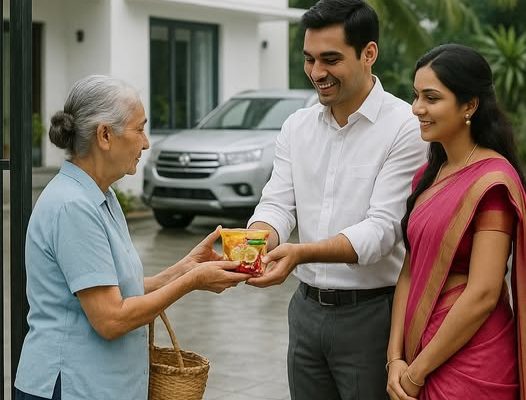It was a rainy afternoon in Quezon province. Dolores, seventy years old, hunched over her cane, trudged slowly along the muddy gravel road. Her bag, faded and worn, carried medical papers and a few loose pesos—barely enough to buy bread and salt.
Her heart pounded not just from the long walk, but from the desperate hope that her only son, Ramón, could help her. The doctor had warned her: she needed urgent heart surgery. The cost? Tens of thousands of pesos—money she simply did not have.
Ramón, her son, had grown into a successful businessman. He ran a thriving building materials shop in Quezon City, lived in a grand house, and drove a car that gleamed in the sun. Dolores believed, naively or perhaps faithfully, that a mother’s plea would be enough for him to open his heart.
When she reached the tall iron gates of Ramón’s home, she pressed the bell. Ting-ting.
A young woman appeared—Ramón’s wife—her eyes sharp and impatient.
“What do you need, Nanay?” she asked curtly, glancing at Dolores’ worn clothes.
“I… I came to see Ramón,” Dolores said softly, clutching her medical papers.
The young woman disappeared inside, and moments later, Ramón appeared, phone in hand, looking as if he had stepped out of a boardroom.
“Mom, what brings you here? I’m busy right now,” he said, his tone polite but distant.
Dolores’ voice shook as she held out the report. “Son… the doctor says I need surgery soon. Could you help me? I’ll pay you back when your brother sells the rice.”
Ramón sighed, his gaze flicking to his wife. “Things are tight at the business. I… I don’t have cash. Go home, and I’ll think of something.”

Tears welled in Dolores’ eyes, but she forced a calm smile. “Just a little, enough for the hospital, please…”
He hesitated, then, as if weighing a secret, opened the car trunk. He handed her a single packet of instant noodles.
“For now,” he murmured. “I’ll send money later.”
And with that, he gently nudged her toward the gate. The rain had begun, cold and relentless. Dolores hugged the packet to her chest and walked home through the storm, feeling a mixture of sadness and shame.
Back in her small wooden house, soaked and shivering, Dolores placed the noodles on the table. Hunger gnawed at her, but she hesitated, sensing something unusual. When she opened the package, her hands froze.
Beneath the noodles lay a small, sealed envelope.
Her fingers trembled as she tore it open. Inside were crisp bills—50,000 pesos—and a note, written hastily:
“Mom, forgive me for lying. I didn’t want my wife to know. I was afraid she’d think I favor my family. Please use this for your surgery. I love you more than I can say. Your unworthy son, Ramón.”
Dolores sank to the floor, tears blurring her vision. Relief, love, and understanding mingled in her heart. Her son had never been indifferent—he had only been afraid, trapped between love for his mother and the fear of judgment.
The next morning, Dolores went to the hospital. The surgery was a success. Weak and frail, she awoke to find Ramón sitting beside her, eyes red and swollen from crying.
“Mom… I’m so sorry,” he whispered. “I shouldn’t have sent you away. I was scared… of what my wife would think.”
Dolores reached for his hand, her smile gentle. “A mother never stays angry. Money can be earned again, but a mother’s heart, once broken, cannot be replaced.”
Ramón broke down, burying his face in her hand. Outside, sunlight poured through the window, warm and golden—a symbol of forgiveness and renewed love.
From that day, Ramón changed. He visited his mother often, brought her food and medicine, and repaired her old wooden house. His wife, once distant and sharp, began to understand the deep bond between mother and son.
The story of the noodle packet spread through the barangay, a quiet reminder of love hidden beneath pride and fear.
For Dolores, the most precious gift wasn’t the money—it was the love that had endured through silence and hesitation. She would often sit by her window, smiling softly as she whispered:
“That packet of noodles… was the best gift my son ever gave me.”
No matter how far we rise in life, we must never forget the ones who gave us life. A simple act—a word, a hug, a visit—can warm a parent’s heart for a lifetime.



